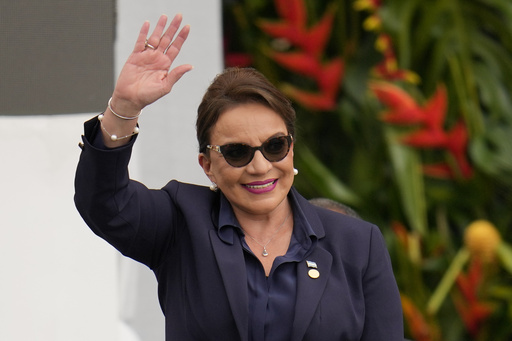
TEGUCIGALPA, Honduras — On Tuesday, President Xiomara Castro of Honduras changed her stance regarding the ongoing extradition treaty with the United States, opting to maintain the agreement following discussions with the administration of U.S. President Donald Trump.
This decision comes in the context of the Trump administration’s recent efforts to forge agreements with several Central American countries to take back deported migrants from various nations. Negotiations were often influenced by pressures or promises of assistance on differing matters. Castro shared the news via a post on social media, expressing optimism about the continuation of the treaty under strengthened protections for Honduras.
Honduras was not included in U.S. Secretary of State Marco Rubio’s recent tour of Central America. While the country has been handling the return of its own deportees, there has been no indication of an agreement that would enable Honduras to accept migrants deported from other countries.
In a related move, Mexico deployed a contingent of 10,000 troops to the U.S.-Mexico border in February amidst threats of significant tariffs. Moreover, the Colombian government recently encountered pressure from the Trump administration, leading to a compromise after officials previously refused to accept deportation flights using U.S. military aircraft.
Foreign Minister Eduardo Enrique Reina confirmed on Tuesday that the extradition treaty was a focal point in direct discussions with the White House. He mentioned that the dialogue encompassed five significant topics: migration, military agreements, free trade, investments in trade infrastructure, and the extradition arrangements. However, it remains unclear what specific benefits Honduras might receive from this revised agreement.
Reina emphasized that the extradition treaty would feature “important, normal safeguards,” ensuring that extradition cases would remain free from political influence and grounded strictly in legal terms. This marks a notable shift from Castro’s previous position. In August, she had announced plans to terminate the treaty after the U.S. ambassador raised concerns regarding a visit by Honduran military officials to Venezuela, where they interacted with figures accused of drug trafficking by the U.S.
The ambassador’s remarks spurred backlash within the Honduran government, prompting the decision to abandon the treaty. This treaty has previously led to high-profile figures, including former President Juan Orlando Hernández — currently serving a 45-year prison sentence in the U.S. for drug trafficking — being extradited.
In the wake of Castro’s initial announcement about canceling the treaty, her brother-in-law, Carlos Zelaya, was implicated in a video featuring him along with notorious drug traffickers negotiating a bribe. This incident ignited further public outrage, leading many to believe that Castro’s true motive for withdrawing the treaty was to shield her family from legal repercussions.
During the recent statements, Reina indicated that the decision to uphold the extradition treaty is vital for maintaining the democratic process and integrity of the upcoming elections in Honduras, in which the military plays a critical role as a guarantor. He asserted, “We are not here to favor politicians or criminals, but if the extradition treaty is wielded to undermine the government or elections through intimidation of the armed forces, that is a concern for us.”

